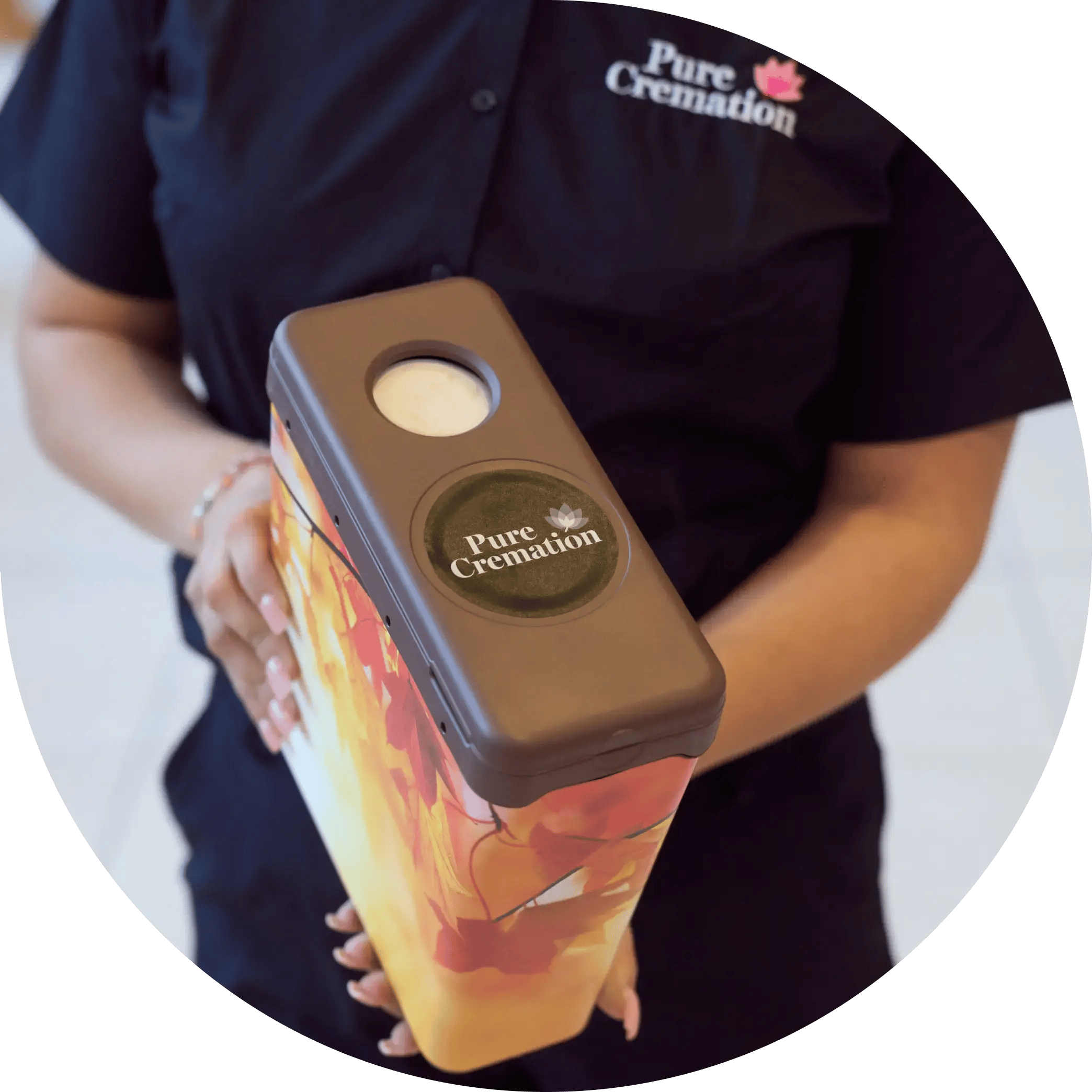When someone passes away, they are collected by the funeral company and taken ‘directly’ into their care (rather than kept with a local funeral director who would later take them to the crematorium in a hearse).
In every other way, a direct cremation is like a traditional funeral. However, because there’s no hearse, no crematorium ceremony and no funeral director fees to pay, a direct cremation is usually the most affordable kind of funeral there is – often less than half the price of a traditional funeral.
Direct cremations are also sometimes called ‘unattended cremations’ or ‘unattended funerals’. This just refers to the fact that family do not attend a ceremony at the crematorium. It doesn’t mean there is no-one in attendance at the cremation – the professionals who work at the crematorium will be there, ensuring that a respectful, dignified cremation takes place.
In fact, at Pure Cremation, our experienced, award-winning staff bow to each person in their care, before the cremation.
What does a direct cremation include?
It’s worth knowing that not every provider is the same. A Pure Cremation funeral plan, for instance, comes with the Pure Price Promise which means everything you need is included in the price.
But some other companies will charge extra for things such as collection from hospital or to return the ashes.
What’s not included with a direct cremation?
2. More expensive coffin options, such as a different finish or handles
4. Family attending the crematorium (although Pure does offer this as an optional extra)
Pure Cremation is the best-known company for direct cremations – to such an extent that people describe this kind of funeral as a ‘pure cremation’ more often than they say ‘direct cremation’.
Every year, thousands of people contact Pure Cremation to arrange a pure cremation for a loved one who has died, knowing we will take care of everything.
Even more take out a pure cremation funeral plan to lock in their funeral at today’s prices, so family won’t have to arrange or pay for a thing.
How to arrange a direct cremation
If someone has died and you need help arranging a direct cremation funeral, you can call us at any time of the day or night, 365 days a year – there’s always a friendly, helpful specialist waiting to support you.
Just call us free on 0800 160 18 81.
Here’s what you can then expect:
The five biggest benefits of a direct cremation
A direct cremation may be chosen by someone who doesn’t have family to attend a ceremony. But it is also often chosen by people who have lots of friends and family, so there is no restriction on who can attend a separate service.
Direct cremations are also popular with people who want a non-religious funeral – but at Pure Cremation we also have many customers who are religious, and whose faith is honoured in the service their family arrange for them, singing hymns and saying prayers.
The five main advantages of a direct cremation are:
1. Avoids unnecessary expense on a hearse, flowers, ministers, etc
2. Takes pressure off family having to make difficult choices
3. Means none of the ‘fuss’ of a traditional funeral that many people don’t want for themselves
4. Allows family to arrange any send-off they wish, wherever they want
5. Can be less than half the price of a traditional funeral

In the words of our families
These are just a few of the comments on Facebook from people and families who used Pure Cremation:
Five myths about direct cremation

With Pure Cremation, families can arrange any send-off, funeral service or celebration of life they wish
1. It’s for people who don’t care.
That’s not the case – in fact, in can be quite the opposite. A traditional funeral includes a service that you may not get much say in, for example it will be at the crematorium, there will be a time limit and a limit on who can come and what you can do. With a direct cremation, family can arrange any service or send-off they wish. And the advantage is, there are no difficult decisions to make about coffin handles or which flowers, whether to have a limousine and so on.
Plus, people who’ve bought a plan from us – which is much more affordable than a traditional funeral – have said they chose us because, ‘I’d rather my money went to my family, rather than a funeral director’.
2. You don’t get a coffin.
This is not true. At Pure Cremation, everyone has their own, solid wood, environmentally-friendly coffin which they are placed in as soon as they are in our care.
They rest peacefully in their coffin at our mortuary until the cremation, and then they are given a unique ceramic disc which survives the cremation and guarantees the identity of their ashes.

Someone arriving into our care, where they will rest peacefully until their cremation

Staff at our Charlton Park Crematorium, with its own Garden of Remembrance in 10 acres of parkland
3. There’s no-one there when you’re cremated.
This myth is because a direct cremation is sometimes called an ‘unattended cremation’. It doesn’t mean there’s no-one at the crematorium, it just means family don’t have a service there. The professional staff are always in attendance, performing the cremation with the utmost care and respect.
In fact, in a traditional funeral, although the coffin may go behind a curtain during the ceremony (known as the ‘committal’), the cremation doesn’t usually happen there and then – it may be performed several days later. In that regard, a traditional funeral is no different from a direct cremation – family aren’t there during the actual cremation.
Pure Cremation also offers family the option to have a service at our crematorium, whether in our chapel or Oak Room, if they wish.
4. It’s impersonal.
Families ask us to place items in with the deceased before their cremation and they can come to visit the crematorium if they want. Some faiths require family to witness the start of the cremation, and we will arrange that.
And of course, a direct cremation means family are not restricted to a ceremony at the crematorium, so they can arrange a send-off that’s much more personal.

Our viewing gallery, for families who wish to witness the committal just before the cremation

One of our biodegradable urns with its ceramic disc for complete peace of mind
5. There’s nothing to remember you by.
Cremations are far more common than burials nowadays, which means you’re not likely to have a gravestone, but there will be an urn containing the person’s ashes. This could be kept at a family member’s home, or in a columbarium (typically a room in a church or cemetery building with ‘niches’, which are cubbyholes for holding urns).
At Pure Cremation, we return the ashes in a biodegradable urn, which means that it can be buried and a memorial stone could be placed there, or a tree planted to remember the deceased.
In addition, Pure Cremation gives everyone in their care an individually-numbered unique ceramic disc. Because it is ceramic, it survives the cremation intact and is used to guarantee the identity of the person’s ashes. This is included with the urn when it is returned to loved ones, as another token to remember them by.
Frequently asked questions
What is a direct cremation plan?
A direct cremation plan simply means a funeral plan for a direct cremation. That’s what a Pure Cremation funeral plan is – and more people buy one of our plans than any other plan, whether direct cremation or traditional.
Buying a plan means you know your wishes will be followed, and it also means that your family won’t have to find the money when the time comes. Buying now means you’re securing a funeral at today’s prices, which lots of people like, since funerals have become more expensive over the years, and often at a faster rate than other costs.
Can I have a direct cremation near me?
You can – although local funeral directors typically don’t have their own crematorium, so although the cremation might be reasonably close to where you live, it won’t actually be performed by the funeral director.
Most direct cremations are carried out by a trusted, national brand like Pure Cremation. We will collect someone from anyone in mainland Britain and bring them into our care, performing the cremation at our own crematorium.
We then return the ashes, personally and by hand to loved ones, so they never have to travel anywhere – and of course they can arrange a send-off nearby, perhaps in a place that was meaningful to the person who has died.
What is the cheapest direct cremation?
A direct cremation may be less than half the price of a traditional funeral.
Funeral directors do not always make it easy to identify which is the cheapest, as, while Pure Cremation prides itself on having funeral plans with an ‘all-inclusive’ price, other companies will advertise one price but add on extras – hidden charges that family would have to pay.
It’s always best to look at several companies and decide who you trust to provide the funeral you want – and if you’re buying a plan so that family don’t have to pay anything or make any arrangements, choose a plan that includes everything you need.
How do I arrange a direct cremation?
You can arrange a direct cremation with your local funeral director if you wish. However, bear in mind that’s not ‘going direct’ as they are unlikely to have their own crematorium and will charge funeral director fees to make the arrangements.
You can also speak to a national company like Pure Cremation. If someone has died and a funeral needs to be arranged, we have a team on call 24 hours a day, 7 days a week. We can help relieve pressure and immediate stress by ensuring that the deceased has a dignified direct cremation at our highly-regarded crematorium, set in over 10 acres of beautiful parkland.
Need help arranging a funeral now? Call 0800 160 1881
What is it meant by unattended?
9 out of 10 direct cremations are unattended at Pure Cremation, which means there are no mourners present for a funeral service at the crematorium or at the cremation itself. Our experienced cremation technicians will carry out the process with utmost respect and without anyone present – whether that is family or friends.
Do you need a coffin for a direct cremation?
Yes. In the UK, cremations will include a coffin, and that includes direct cremations. At Pure Cremation, everyone in our care has their own solid wood, environmentally-friendly coffin. Some other providers only offer ‘wood veneer’ coffins, but all direct cremations do have a coffin.
Which coffins are best for cremations?
A wide range of coffins can be used – wood (solid or veneer), wicker, bamboo or even cardboard coffins. At Pure Cremation we only ever use solid wood coffins. Ideally, a coffin will not include metal parts that would not be cremated. Environmentally-friendly coffins are also a key consideration, and at Pure we get our coffins from sustainable sources.
How much does a direct cremation cost?
A direct cremation can be £2,000 less than a traditional funeral. The SunLife Cost of Dying report shows that direct cremations like a pure cremation are the lowest cost. A traditional funeral cost an average of £4,285, whereas a pure cremation funeral plan costs just £1,995.
Because there’s no hearse, funeral director fees or ceremony at the crematorium, having a direct cremation may mean more money for family or for the send-off.
You can get a quote for a pure cremation if you need to arrange a funeral for someone now. Or you can buy a plan (for yourself or for someone else) that means we will make all the arrangements when the times comes. Our plans can be bought in a single go, or to make them even more affordable, we also have lower monthly instalment options.
Once arranged, you do not need to pay anything else. With other providers, it is worth checking their small print, as they may have additional costs that mean you could pay more than their published prices depending on your circumstances.
Does Pure offer a direct cremation near me?
Yes. We collect someone when they have passed away – from their home or a hospital – anywhere in Britain. We then take them into our care and perform the committal at our Charlton Park crematorium in Andover. Afterwards, we return the ashes to next of kin, personally and by hand.
The family can arrange a service that’s near them, perhaps somewhere that was a favourite of the deceased.
What do I need to do when someone dies?
When someone dies, there are some practical steps that need to be taken, including things you need to do immediately.
Our free guide on ‘what to do when someone dies’ will tell you everything you need to know and has links to other online useful resources.
How long does the cremation take?
The actual cremation, typically takes around 90 minutes, but may take up to two and a half hours.
The whole service we provide, from collection of the deceased to returning the ashes by hand, typically takes around three weeks.
A local funeral director will usually take longer, because they do not have their own crematorium and so have to book in the cremation with a third party.
The exact length of time the whole service take will depend on how quickly the paperwork is provided by the medical examiner’s office, which is needed before the cremation can take place.

.webp?width=1722&height=1488&name=What-is-a-direct-cremation@2x%20(3).webp)
.webp?width=1242&height=696&name=What-is-a-direct-cremation_mobile%20(3).webp)
